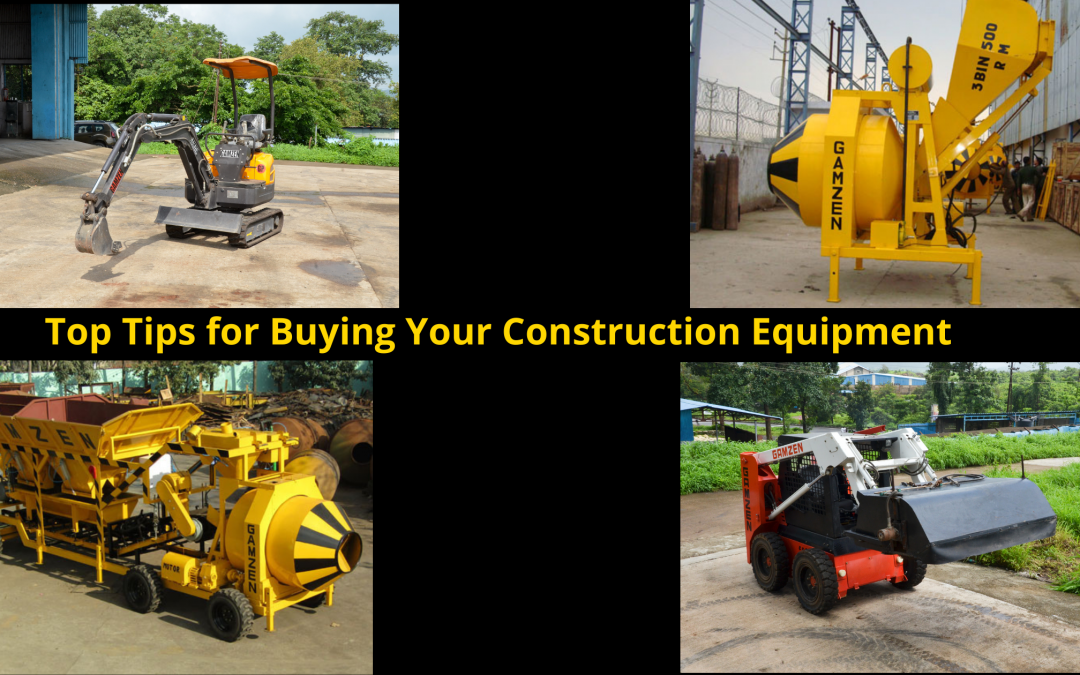Buying Construction equipment of the right kind for various construction and infrastructure projects may seem a daunting task at first. You have to factor in the duration and scale of the project, the budget allocated, and equipment usability. Purchasing the wrong equipment may extend the project cost and time along with encountering many challenges. Purchasing the right equipment, on the other hand, virtually guarantees the project’s success. But purchasing heavy equipment becomes an easy task if you keep certain things in mind. First of all, think of buying heavy equipment just like buying a personal vehicle. Both of them require nearly the same checklist. You want the best features for the price paid like safety measures, fuel efficiency, technical advantage, functionalities, and other capabilities. To help you make the right decision, we have compiled some pointers on buying heavy equipment whether new or used. The initial part of the article discusses general pointers while the latter one is exclusively devoted to tips regarding used equipment.
1. General Tips on Buying Construction Equipment for sale
Follow these simple tips for buying heavy machinery best suited for your purposes.
a. Determine Your Requirements
Determine what kind of Construction equipment is needed for the project. It includes evaluating the job site and work requirements. Do you need Construction equipment like full-sized excavators and cranes or compact skid loaders? Small job sites like street and pavement construction may require compact equipment while a big construction site may require much bigger equipment to get the job done. Evaluate all pros and cons and then decide on the outcome.
b. Evaluate Your Pre-Existing Equipment
Evaluate your pre-existing Construction equipment list first. Check if your older equipment can be fixed or upgraded to meet the new job requirement. Then only decide if the need to buy new machinery is justified.
c. Availability of Spare Parts and After Sales Service
Before buying Construction equipment ensure that the spare parts and after-sales service are easily available. Also check if the specialists are widely available for repair, service, and exchange of replacement parts. Choose the machinery that checks all these parameters.
d. You can Buy Equipment in Stages Too
You can also schedule your purchase of Construction equipment as per the project progression. Buy machinery according to the project phase. Evaluate the machinery requirement before beginning the next phase and then take the decision. Maybe all the work can still be performed by the machinery at hand. It will prevent the wastage of money and resources. If you buy all the heavy machinery beforehand, there is a chance that a number of it may remain unused. Therefore, buy the machinery as per the progress made.
e. Expertise in Operating & Handling
Choose the Construction machinery that your operators and workers can handle or be trained in easily. Incorrect operation and handling of heavy machinery may harm workers and cause damage to the site and machinery itself. Do take the advice of operators who will handle the machinery before buying it.
f. Check the Equipment Yourself
Before buying Construction equipment, if possible, go check it yourself or send someone on your behalf. Review the safety features and quality standards are the same as advertised. Check if the machinery will be compatible with your project’s needs. Check its ease of use, durability, and sturdiness. Then only take the buying decision.
g. Buy Versatile Machinery
Buying versatile machinery is particularly useful if you are working on multiple projects or if your project entails different activities. For example, skid steer loaders are versatile machines that can perform a wide range of activities. These can be used in various infrastructure, agricultural, and construction projects effectively.
h. Detailed Research
Your potential Construction equipment list should be backed by serious research. These should include equipment models, brands, and dealers. Compare between different models and brands. Check the different components of each model. Enquire about the dealers of the machinery you are interested in. Find out if they are trusted and have generated goodwill in the market. Ask extensively from the dealers too. Enquire about their after-sales service. Ask for quotations from different dealers and compare them. Bargain on the price and benefits like extended warranty and increased duration of free after-sales service. All this research will help you make the right decision.
g. Economical and Online Deals
You can also search online for getting a good deal on heavy machinery. Many reputed Construction equipment manufacturers like Gamzen have their websites. Here you can find a detailed list of heavy machinery suited to different projects. You can also purchase used heavy machinery. It will save you a lot of money and work like a new one. To buy used heavy machinery, you have to check its working condition, quality, and certain other factors. These are all discussed separately in the section below.
2. Tips for Buying Used Construction Equipment for Sale
Follow these simple tips for buying used Construction machinery best suited for your project.
a. Seller Enquiry
Before buying used machinery, inquire about the seller. Ask previous buyers, check for online reviews, and check the seller’s inspection reports. Positive or negative recommendations from these sources will give you a good idea about the seller’s reputation.
b. Inspect Equipment History-Service History, Paper Work & Warranty
Check the history of used Construction equipment before buying it. This checklist includes the number of working hours, break down and durability history, usage, and service history among others. The service history should be regular. Look for any noticeable gaps. Also, check the warranty on the machine and its replaceable parts. Check the title of the machinery. It should be registered to the person or entity you are dealing with. This ensures that you are not buying stolen machinery. You need to check if the installments have been paid in full or if the machinery has any liens against it. After checking all this paperwork and being satisfied on all fronts, you can go ahead with purchasing the used machinery.
c. Detailed Fluid Checking
Before buying used heavy-duty equipment check the condition of fluids like coolants, engine oil, transmission fluid, hydraulic fluid, etc. The condition of these fluids will tell you a great deal about the usage and maintenance history and the present condition of the machinery. Low level and dirty fluids clearly talk about the abuses the machinery took and bad maintenance history. Water in the engine oil and leaking fluids are a red flag too. Avoid buying any heavy machinery that has all these issues.
d. Number of Operating Hours of Machinery
Check the previous operating hours of the used heavy machinery you are planning to buy. Match it against the warranty on the product which may also include the duration of working hours. Check the maintenance records too. Do a cost calculation taking into account your project or future intended usage of the machinery. In this way, you will come to the right purchasing decision.
e. Wear & Tear
Look for signs of wear and tear on the used Construction equipment you are planning to purchase. Some signs of usage and wear & is tear is normal but ensure the machinery has not endured major damage. Look for rust and other damage, hairline cracks, working state of the engine, and welds. All these may result in a future breakdown of machinery which may be expensive to repair and also include loss of critical working hours. Ask the seller if any parts have been replaced or added and the warranties on it. New parts may have been installed for upgrading or extending the life of the machinery. But avoid buying if these parts were installed due to accident or heavy damage.
f. Test Drive/Operate
Ask for a test drive or operating the equipment before buying it. The seller should readily agree to it. If they refuse, then certainly something is wrong. During the test drive, let the equipment run for a few minutes. Check and listen for any unusual noises that may include knocking, creaking, squeaking, and whining. This reflects the damaged state of the engine and machinery. Avoid buying if you encounter these issues.
Conclusion
Buying the right Construction equipment is crucial for your project to succeed. Buying heavy machinery is a large capital investment that should be done right. The tips shared above will help you make the right decision in buying the best machinery, whether used or new, for your business.

